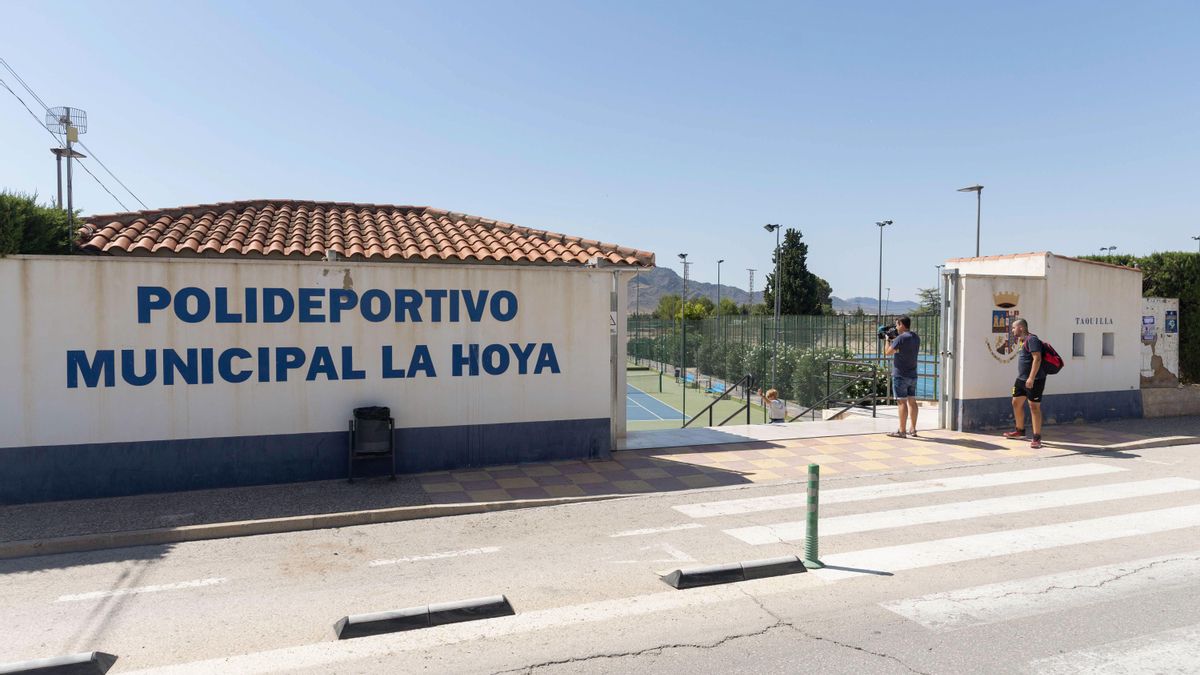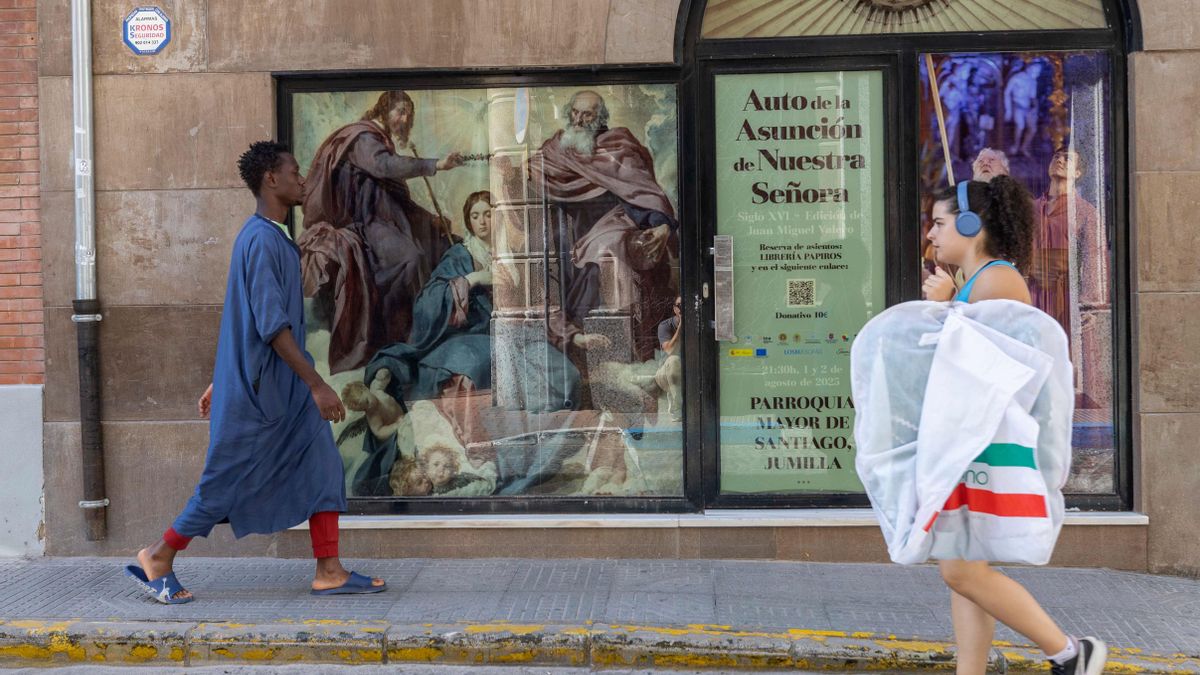“Although I was born in Jumilla, every time I walk through its streets, I feel that I am nothing more than a foreigner.” Ahmed's voice does not tremble, but his eyes do. He carries the Murcia accent in the tongue, the aroma of orange blossom in clothes, and the invisible weight of the shoulder rejection. He was born in this municipality nineteen years ago, and went to school with the children of those who today look at him in side. Know its streets as the palm of your hand, and yet, in the corners of Jumilla it does not always find belonging: it finds distrust, silence and sometimes fear. Not yours, but others.
In this land of vineyards and traditions, where the sun falls without asking permission, there is a community that lives in the shadow. Not by choice, but because a part of the people – sometimes subtly, sometimes hard – has decided to look the other way.
Sitting at the Bank of the Antonio Bernal Park, it makes a reflection that encloses a rest of restlessness and bitterness: “Everything has been politicized. Before we lived well. Now it seems that everyone has to choose side. That is what really worries me.”
They are his honest words to the situation that has aroused the discomfort between the Muslim community that resides there. The City Council of Jumilla, governed by the Popular Party (PP), and with the decisive participation of the only councilor of Vox, Juan Agustín Carrillo Navarro, has approved a full agreement that will prevent municipal sports facilities being used for cultural, social or religious events not organized by the Consistory.
This does not only go from the pavilion. They are telling us that we are not part of Jumilla
Ahmed
— Jumilla neighbor
Next to Ahmed, his mother, Fatima Bouziane, neighbor of the Santiago neighborhood and with three children in charge, is debated between pain and helplessness: “What damage do we do for praying one day a year together? We have been here for years, living with the rest of the neighbors, organizing, asking for permits, collecting later … has always been peaceful. But now we feel they do not love us.” His son intervene again: “This is not only the pavilion. They are telling us that we are not part of Jumilla. That because they are Muslims we do not have the same rights.”
This decision especially affects the local Muslim community and has unleashed a political, legal and social whirlwind that has caused an intense controversy and criticism from civil organizations and political formations. Expert voices also alert their discriminatory nature.
The one that is most polvanda is the prohibition of celebrations such as the AID al Fit (the Fast Festival that ends Ramadan) and the Aid al Adha (Lamb Festival) in municipal sports facilities, such as the 'Antonio Ibáñez' football field, which, in recent years, has been used by the Muslim community in Jumilla for this purpose.

Outrage, challenges and social alarm
The president of the Spanish Federation of Islamic religious entities, Mounir Benjelloun, has described the measure of “discriminatory”, “racist” and “Islamophobic”, and has already announced that the resolution will be judicially challenged, which is not preceded in the country. Benjelloun regrets the growing climate of persecution where “Muslim children who have been born here now feel rejected by their faith.”
Social organizations, such as the Association of Moroccan Immigrant Workers of Murcia (ATIM), affirm that the measure is a “pure and hard discrimination” and violates equality and international agreements with the Islamic community.
For its part, legal experts, such as José María Contreras, Professor of Ecclesiastical Law of the State of the Pablo de Olavide University, they also argue that, although in the adopted agreement a religion is not explicitly prohibited, the measure has an indirect discriminatory effect: only the Muslim community has requested these spaces for religious events, which affects its constitutional right to the cult.

Local and social effects
With the measure already approved, the foci now move to the courts, where Muslim associations, civil rights groups and political parties announce resources for possible discrimination. Meanwhile, Jumilla's social fabric remains, as happened a few weeks ago in Torre Pacheco, visibly tensioning.
In this Murcian town, with a population census of just over 27,000 inhabitants, around 7.5 % of its neighbors belong to the Muslim religion. Until now, municipal sports facilities allowed mass concentrations for prayers and festivities, while the two local mosques have enough capacity.
This decision of the City Council not only generates a serious logistic problem for the next celebrations of this neighborhood group – which have never generated incidents – but it encourages the disagreement among neighbors.
It hurts, because most Murcians are not like that, we are inclusive and we know how to share the day to day with our neighbors of other nationalities
Andrea Quiñonero
— Jumilla neighbor
Carmen López, a neighbor of the San Fermín neighborhood, says she feels relieved: “I have nothing against anyone, but it was already becoming customary to close the facilities for mass prayers. And the children who train football? Where are they going? This is not Morocco.” Pedro Martínez is expressed in a similar line: “I do not agree that acts are held in Jumilla's sports pavilions for things that have nothing to do with sport. It is not a subject of religion, it is priorities.”
Faced with this vision, Andrea Quiñonero, Jumillana by birth and transferred to the province of Malaga for work, laments that the city that saw her grow has become, according to her, a municipality where “the racist will prevails.” “It hurts, because most Murcians are not like that, we are inclusive and we know how to share the day to day with our neighbors of other nationalities.”
“The shops run by immigrants, many of them Muslims, are the ones who feed us on many occasions. We consume in them, they are the reason that the local economy has not sunk at this point.” It is what Pedro García, a neighbor of the municipality, affirms.
Teresa Martínez thinks on the same line. “My children have Muslim classmates, they go to the park together to play and sometimes the afternoons in my house. There are no coexistence problems, I do not understand this request. Where has the Murcia of the three cultures be left?”
Badr Zuhair, born in Morocco but resident in Jumilla for two decades, says he is relieved by the support of his neighbors despite knowing that they do not share religion. “In the Muslim community, as in all, we deserve peace of mind.” “Those of us who live here are proud to participate in the Spanish economy, either as foreigners or nationalized, but we also need to practice our faith and connect with our roots when important dates arrive,” he says.
The reactions to the news are of such magnitude, that the Spanish Episcopal Conference has decided to pronounce this Thursday: “A decision like this attentive against human rights.” For Spanish bishops, “this type of discrimination should not occur in democratic societies.”